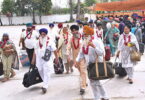F.P. Report
PESHAWAR: The Gandhara Hindko Academy, Peshawar, has published the Hindko language proverbs in dictionary form with features such as ready key and index.
Titled, “ Hindko Matlaan” (Hindko proverbs), the publication has been researched and compiled by Muhammad Ziauddin, a noted Hindko language writer, poet, research scholar, who is also Chief of the Executive Committee of the Gandhara Hindko Academy. The Gandhara Hindko Board runs the academy under the public-private partnership.
A team of four writers assisted Muhammad Ziauddin in bringing out the 852 pages publication. They were Ms Aftab Iqbal Bano, Saqib Hussain, Ali Awais Khayal and Sikandar Hayat Sikandar.
The book contents have been presented in a clear order with the alphabetical arrangement. The 28 pages index provided at the end of the publication is a valuable tool for locating related proverb under identified headings and topics. This ready key is one of the finest features of the book.
Another commendable characteristic is the way proverbs have been explained both in conversational Hindko and simple Urdu. It is a pleasure to read the illustrations in such a transparent and engaging manner.
In the preface to the book, Muhammad Ziauddin says the proverbs have been presented under 660 captions. He has acknowledged distinguished Hindko language writers Akhunzada Mukhtar Ali Nayyar and Sultan Sakoon for their earlier works on the subject. He is all-praise for Aftab Iqbal Bano, Ali Awais Khayal, Saqib Hussain and Sikandar Hayat Sikandar for their assistance.
A noted writer and poet, Ejaz Rahim, in the foreword to the book, has termed the work monumental and exceptional as he introduces the bulky book to the readers.
He says a large number of proverbs listed in the publication echoes Hindko’s vast and organic structure. “This compilation is indeed a pioneering document that will enable a treasury of Hindko proverbs, idioms and epigrams to be conveniently accessed by erudite writers and common citizens alike. Its practical value for the academia, both teachers and students, as well as everyday users of the language, cannot be over-emphasized,” opines the writer.
“The book of Hindko proverbs will bring the folk wisdom to the threshold of many generations of those who speak the Hindko language,” says Ejaz Rahim, who is a retired bureaucrat and has served as chief secretary of Khyber Pakhtunkhwa and federal secretary.
He has praised Ziauddin for not only working for the promotion of Hindko but also for his passionate love for all Pakistani languages by advocating their rights.
Aftab Iqbal Bano has termed the book a comprehensible publication. The Canada-based literatus says the book has saved an important part of our heritage which has been bequeathed to us by our elders. She hopes the publication will prove to be of great help when Hindko language is included in school, college and varsity curricula.
A young researcher of Hindko language, Ali Awais Khayal, has devoted the initial 12 pages of the book to the importance of the proverbs in a language. He has quoted several illustrious writers such as Shanul Haq Haqqi, Iftikhar Arif, Prof Nasir Daud, Dr Abdul Ghaffar Kokab, Prof Muhammad Ameen, Mukhtar Ali Nayyar, Prof Dr Nazir Tabassum and Maqbool Ejaz Ejazi to explain his point.






